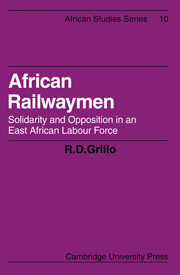Book contents
- Frontmatter
- Contents
- List of figures
- List of tables
- Acknowledgements
- List of abbreviations
- Fig. 1 Kampala City: main urban area and suburbs
- Fig. 2 The EARH Housing Estate at Nsambya and immediate environs
- Introduction
- 1 The social and economic framework
- 2 The railway community in East Africa and at Kampala
- 3 Towards an African proletariat?
- 4 Social relationships and the industrial framework
- 5 Status, reputation and class
- 6 Social mobility: strategies for success and responses to failure
- 7 Urban associations and competition for status
- Conclusion
- Appendixes
- Notes
- List of references
- Index
6 - Social mobility: strategies for success and responses to failure
Published online by Cambridge University Press: 04 August 2010
- Frontmatter
- Contents
- List of figures
- List of tables
- Acknowledgements
- List of abbreviations
- Fig. 1 Kampala City: main urban area and suburbs
- Fig. 2 The EARH Housing Estate at Nsambya and immediate environs
- Introduction
- 1 The social and economic framework
- 2 The railway community in East Africa and at Kampala
- 3 Towards an African proletariat?
- 4 Social relationships and the industrial framework
- 5 Status, reputation and class
- 6 Social mobility: strategies for success and responses to failure
- 7 Urban associations and competition for status
- Conclusion
- Appendixes
- Notes
- List of references
- Index
Summary
So far our discussion has been largely synchronic in that it has analysed the position of a railwayman, his status and the groups with which he identifies, at one point in his career. That through time this position may change has been largely ignored, as has the fact that conditions within the industry itself are changing. Perhaps the most important change the individual experiences in the course of his working life is promotion from one post to another, which is frequently accompanied by transfer between depots. The significance of promotion as a channel of social mobility needs little emphasis after the discussion of status in the previous chapter. Railwaymen accept both that grade, occupation and income provide measurements of relative rank and that the individual can and should advance his social standing relative to others by upward mobility within the industry. Since the opportunities for such advancement are limited, a competitive element is built into relationships at work, and this spills over into the extraindustrial context. A ‘big man’ has achieved his status by competing successfully against others, and those who have not attained promotion when opportunities exist are deemed to be failures. Since the rewards, both material and social, are considerable, it is not surprising that competition for advancement is usually aggressive and sometimes violent. Throughout the history of the labour force promotion has been available in some form for at least some Africans, but as we have already seen, during the period of the present study political and social changes created a novel situation in which the opportunity for rapid advancement became available to thousands of workers.
- Type
- Chapter
- Information
- African RailwaymenSolidarity and Opposition in an East African Labour Force, pp. 120 - 147Publisher: Cambridge University PressPrint publication year: 1974



